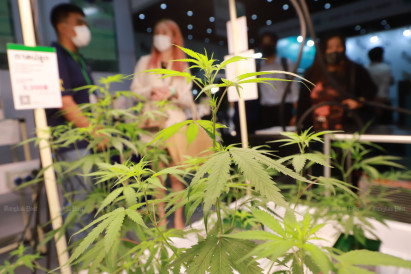Fast-growing industry will remain in regulatory limbo until after the election as MPs clash again

The House of Representatives has almost run out of time to pass the much-awaited cannabis bill, as lawmakers remain divided over key provisions, leaving the fast-growing industry in regulatory limbo.
The House failed to conclude the second reading of the bill on Wednesday, the last session earmarked for the controversial legislation before it goes into a recess next week.
House dissolution is expected to follow in early March as parties gear up for the election that will be held no later than May 7.
The delay was caused by some MPs arguing that the cannabis and hemp bill lacked the teeth to prevent recreational use of cannabis and demanding that the plant be listed as a narcotic again.
Decriminalisation of cannabis was championed by the Bhumjaithai Party during the 2019 election campaign as a way to create a new economic crop with widespread medical, food and beverage applications.
Thailand became the first country in Asia to decriminalise cannabis in June by delisting the plant as a narcotic but has since struggled to prevent its use for recreational purposes and the proliferation of dispensaries selling everything from cookies and cosmetics laced with its extracts.
Growing concerns about the impact of legalisation on young people have also threatened to set back an industry that is forecast to be worth over $1 billion by 2025.
Cannabis liberalisation has divided political parties. Bhumjaithai, led by Public Health Minister Anutin Charnvirakul, is seen as a major beneficiary after it spearheaded the plant’s wider use and cultivation by households. Many of the opposition parties and the Democrat Party, a member of the ruling coalition, want to roll back decriminalisation.
“It’s clear that the bill will not be passed in this sitting. We will re-submit the cannabis bill in the next parliament,” said Supachai Jaisamut, a Bhumjaithai MP. “People who don’t want cannabis to be criminalised again should vote for Bhumjaithai.”
The government has repeatedly said decriminalisation was aimed at medical and commercial use for marijuana rather than recreational purposes, though the draft bill stopped short of explicitly outlawing recreational smoking.
Ad hoc cannabis-related rules issued by the health ministry are adequate to keep the industry in check for now, Mr Supachai said. The rules include restrictions on causing unpleasant smells in public, selling to pregnant women or people under 20 and commercial advertising.

